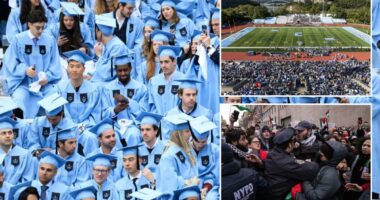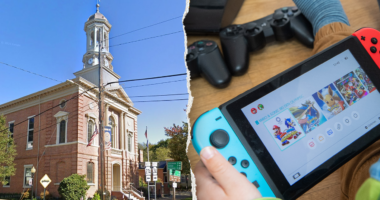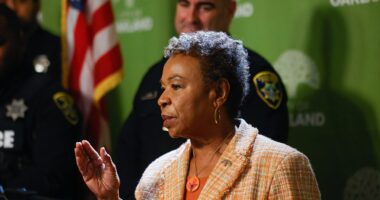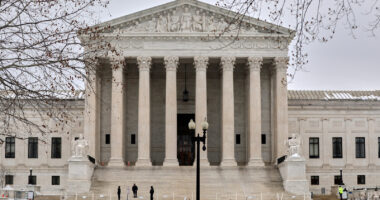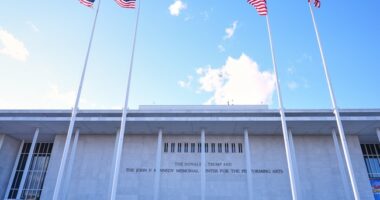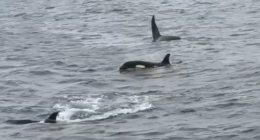Share this @internewscast.com

Big Bird deserves to lose this time.
Historically, whenever Republicans attempted to slash federal funding for public broadcasting, the iconic eight-foot-two Big Bird was showcased as a symbol of everything positive and essential about PBS, thus safeguarding its federal support.
Big Bird, the beloved character imagined by Jim Henson, might sustain his unbeaten streak in defending the channel. However, a rescissions bill backed by Trump offers the strongest opportunity in decades, if not ever, to cut funding for public broadcasting.
This bill, which aims to retract previously allocated funds, has already been approved by the House and is now awaiting consideration in the Senate, where the filibuster rules do not apply.
The measure targets $9.4 billion in federal spending, including funds for the Corporation for Public Broadcasting.
The CPB gets about $500 million a year from the federal government, and parcels it out to NPR, PBS and local public radio and TV stations.
NPR maintains that it only gets about 2% of its funding from the federal government, with more coming indirectly via member stations. PBS gets about 15% of its funding from the feds.
If NPR and PBS programming is as compelling and vital as its defenders say, it shouldnât be a heavy lift to get foundations, philanthropists and devoted listeners and viewers to fill any funding gap.
The organizations have already given out a lot of tote bags during fundraising drives. Surely, they can give out some more.
Decades ago, with the rise of cable TV and a proliferation of sources of news and entertainment, it seemed absurd for the government to have to prop up a few select media sources.
How much more ridiculous it is now, in the age of YouTube, social media, satellite radio, Substack, streaming services and podcast platforms.
Lyndon Baines Johnson signed the Public Broadcasting Act creating the CPB in 1967, and like many other Great Society programs, public broadcasting is an anachronism that wonât go away.
Big Bird himself is approaching the age when heâll soon begin to be eligible for senior-citizen discounts.
Supporters of public broadcasting extol the virtues of âAll Things Considered,â the âPBS NewsHour,â and âFrontlineâ â and yes (political bias aside), journalists do some good work for these programs.
They also (again, political bias aside) do some good work at the New York Times and CBS News, yet neither of these of these outlets depend on federal tax dollars.
Oh, defenders also ask, how can we possibly do without the wonder of educational programming like âSesame Streetâ and âDaniel Tigerâs Neighborhoodâ?
âSesame Streetâ is, indeed, an American institution. But even if PBS collapsed tomorrow, the show would certainly go on.
For about a decade now, new episodes have been featured on HBO or Netflix, demonstrating how a venerable 50-year-old project can adapt to the times.
Itâs simply not true, by the way, that we depend on PBS for good shows for kids.
Thereâs been educational programming developed by Nickelodeon (âBlue’s Clues & You!â), Scholastic Entertainment (âThe Magic School Busâ), and Netflix (âAsk the StoryBotsâ and âAda Twist, Scientistâ).
And somehow such iconic childrenâs programming as âDora the Explorer,â âPeppa Pigâ and âBlueyâ were created without the involvement of PBS.
Then, thereâs the argument that a cut-off of federal funding will be devastating to local public-radio stations in rural communities.
Itâs true that small stations could go out of business, but as anyone who has been paying attention has noticed, we live in an era of great media churn. Private media entities are going out of business â and being created â all the time.
The government shouldnât extend its favor to a few select outlets.
Especially not when these outlets are so blatantly and pervasively biased.
NPR and PBS provide left-of-center content for left-of-center audiences under the guise of objectivity.
As many legacy media organizations have long demonstrated, there is a business model there, but itâs not one that deserves or needs taxpayer support.
Big Bird should, finally, make his own way in the world.
Twitter: @RichLowry




